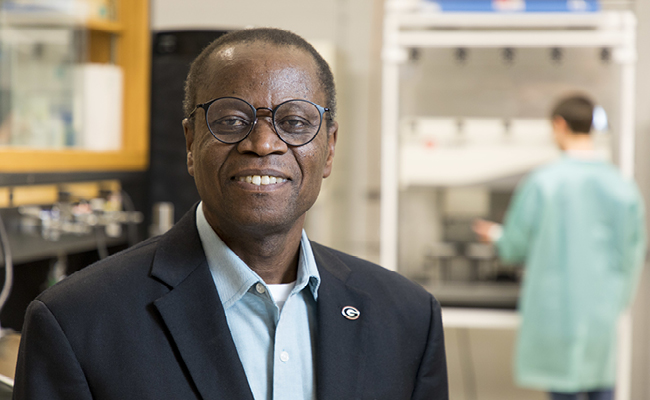
William Kisaalita
Engineers are tasked with finding solutions to some of the world’s most pressing challenges. There may be no greater challenge, and no greater calling, than finding solutions to challenges faced by people in low-resources settings.
A new book written by William Kisaalita, a professor in the University of Georgia College of Engineering, is designed to provide students with insights and tools to develop solutions for areas where resources are limited. “Development Engineering: Empowering the Poor through Sustainable Technology-based Solutions” was published recently by Cambridge Scholars Publishing.
“In development engineering, students are prepared to develop, pilot, and evaluate technological interventions designed to improve human and economic development within complex, low resource-settings,” said Kisaalita, University Professor and UGA Athletic Association Distinguished Professor in Engineering.
The book is based on more than two decades of Kisaalita’s experience working with student teams, from capstone projects to commercialized solutions or interventions, in complex low-resource settings like sub-Saharan Africa. In “Development Engineering,” Kisaalita relies on story-telling traditions and case studies to make complicated concepts accessible. For students or faculty involved in innovation and entrepreneurship, the book is designed to shorten the time between the creation of a solution and its adoption. Kisaalita says this is especially important for student solution-developers or innovators new to the cultural and geopolitical settings of a country or region.
Kisaalita believes technological interventions are sustainable if they meet a real need, are affordable by the users, fit within the cultural context and are ergonomically appropriate. Many interventions have failed because of inattentiveness to one or more of these factors, he said.
Development engineering is an important concept for all engineers, according to Kisaalita.
“Faculty and students should have a development engineering foundation to best address several United Nations Sustainable Development Goals, such as no poverty, zero hunger, good health and well being, and affordable and clean energy, especially in low-resource settings,” he said.
Kisaalita has used material from the book in his First-Year Odyssey seminar, Things You Can (or Should Not) Do to End World Poverty. He also uses some of the material in his newly-developed senior/graduate-level course, Development Engineering and Sustainability.
Throughout his tenure at UGA, Kisaalita’s research and design efforts have not only served as academic experiences for students, but have also produced nearly a dozen products. Four of his innovations are in commercial use, designed to empower small-scale agricultural producers in Africa and around the world to achieve order-of-magnitude increase in productivity or reduced labor. His EvaKuula, a biogas-powered device for the preservation on milk freshness in low-resource settings, has been recognized with an American Society of Agricultural and Biological Engineers’ AE50 Award, highlighting the best innovations in engineering and technology for agricultural, food, and biological systems.
Kisaalita received his Ph.D. in chemical engineering from the University of British Columbia and his B.S. in mechanical engineering from Makerere University in Kampala, Uganda. He is a Fellow of the American Association for the Advancement of Science, the Uganda National Academy of Sciences, and a Fulbright Scholar.


